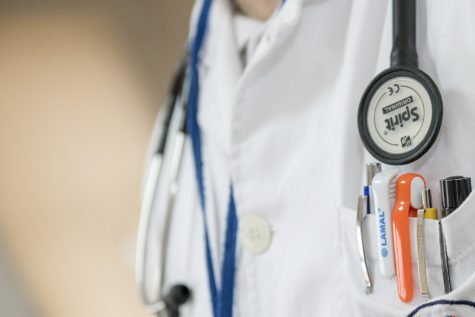ROCHESTER, Minn. — When it comes to treating a serious illness, two brains are better than one. A new study finds that nearly 9 in 10 people who go for a second opinion after seeing a doctor are likely to leave with a refined or new diagnosis from what they were first told.
Researchers at the Mayo Clinic examined 286 patient records of individuals who had decided to consult a second opinion, hoping to determine whether being referred to a second specialist impacted one’s likelihood of receiving an accurate diagnosis.
The study, conducted using records of patients referred to the Mayo Clinic’s General Internal Medicine Division over a two-year period, ultimately found that when consulting a second opinion, the physician only confirmed the original diagnosis 12 percent of the time.

Among those with updated diagnoses, 66% received a refined or redefined diagnosis, while 21% were diagnosed with something completely different than what their first physician concluded.
“Effective and efficient treatment depends on the right diagnosis,” says lead researcher Dr. James Naessens in a Mayo news release. “Knowing that more than 1 out of every 5 referral patients may be completely [and] incorrectly diagnosed is troubling ─ not only because of the safety risks for these patients prior to correct diagnosis, but also because of the patients we assume are not being referred at all.”
Considering how health insurance companies often limit the ability of patients to visit multiple specialists, this figure could be seen as troubling.
Combine this with the fact that primary care physicians are often overly-confident in their diagnoses, not to mention how a high number of patients feel amiss about questioning their diagnoses, a massive issue is revealed.
“Referrals to advanced specialty care for undifferentiated problems are an essential component of patient care,” says Naessens. “Without adequate resources to handle undifferentiated diagnoses, a potential unintended consequence is misdiagnosis, resulting in treatment delays and complications, and leading to more costly treatments.”
The researchers acknowledged that receiving a completely different diagnosis could result in a patient facing otherwise unexpected expenditures, “but the alternative could be deadly.”
According to the release, The National Academy of Medicine cites diagnostic error as an important component in determining the quality of health care in its new publication, Improving Diagnosis in Health Care:
Despite the pervasiveness of diagnostic errors and the risk for serious patient harm, diagnostic errors have been largely unappreciated within the quality and patient safety movements in health care. Without a dedicated focus on improving diagnosis, these errors will likely worsen as the delivery of health care and the diagnostic process continue to increase in complexity.
The study was published in the Journal of Evaluation in Clinical Practice.

Might as well go to a weatherman for a diagnosis.
I do not know about 88%, but as an attorney I must say that many many times the second opinion from an attorney can be quite different from the first.
And look at appellate judges’ opinions in a case. It is fascinating how nine judges who heard the very same case can arrive at such differing ways of looking at the application of the law.
The different opinion of the doctors is not the only thing I noticed. They also do not use the same exact test equipment or machines, and those things can give different results that lead to different opinions and remedies.
BLOOD PRESSURE. I went to one hospital and that doctor used a stethoscope and watch and he says 133. A private clinic doctor used a wrist wrap and it said 98. A different city hospital and doctor who used the arm wrap and it said 113. I went to a WalMart and their machine said 116. All of these readings in a 6 day period. Screw them. I trust WalMart.
Those are normal bp fluxuations.
A chest X-Ray showed a spot on my lung. A PET scan showed it was metabolically active. A surgical biopsy showed it was cancer. The pathologist diagnosed as an extremely rare lung cancer that my surgeon said was 95% likely to have been cured by surgery. Good news. It did not occur to me to seek a second opinion. Two years later, follow up chest X-rays showed new spots on other lung. Doc said it could not be same cancer as it does not behave that way. New biopsy at different hospital gave different diagnosis. Re-checked first tumor and said it was same kind as new ones. So instead of stage I rare lung cancer I had stage IV melanoma. Treatment delayed by two years. Unknown how this will turn out. So sometimes even when you hear good news you should get a second opinion. Maybe with pathology that is always the case.
Hi D, I read one of your comments about cancer treatments on another website and I was wondering if I could ask you a few questions in private (by email, if that’s okay with you).
Hi Lilly. Sorry for the delay. You can find me on Facebook with same username and you can pm me there I believe.
Unlike all my “Natural” and Vegan friends- Doctors are an essential part of your health care team. But they almost always have a “God complex” and are very offended if you mention you read something on the internet or want to see another doctor. In the past, my PCP said I had Emphysema and would be dead in a year. I went to a different doctor and he said my lungs were fine. 5 years later- and I am still alive and no Emphysema. I just had allergies. Another PCP said my heart was as healthy as a 18yo. I had chest pain so I refused to believe him and went to another doctor and he found out I had 2 arteries blocked to my heart. Haha. Almost every doctor’s office now has multiple copies of the WebMD magazine in their waiting room- but God forbid you ever mention you read something on WebMD! Haha. When I mentioned I read something on the Mayo Clinic’s website my PCP said “Don’t listen to them! I know what I am talking about!”.
Because success breeds arrogance in too many.
Interesting but this should be an indicator of what further study should be done. It should not be considered definitive. Notice that these were patients who, either on their own or at the first doc’s suggestion, went for a second opinion. It was a select sample, not a study of all diagnoses. The study says nothing about those who were satisfied with the first diagnosis.
A definitive study would send random patients for a second opinion, whether those patients or their doctors had requested it or not. That would give a better idea of how often the first diagnosis is corretc.
In other news, a new study confirms that studies that study studies are far more likely to have been the study of a study of a study.
CALLING DR. WATSON …
And health care cost continues to rise. We don’t accept this kind service from car dealers. Our Daughter recently spent three days in the hospital and no diagnosis. Mom told her symptoms sounded like thyroid. Her doctor confirmed. No wonder most people have lost faith in health care.
This is pure BS. If this is what we pay the highest healthcare costs in the freaking world for. Our medical system has been hijacked by thieves masquerading as doctors.
This proves without a doubt that American healthcare RIPS YOU OFF. 90 PERCENT !
How can they say they are not stealing !
This is an effing crime.
Either the first opinion or the second in 90 percent of the cases was wrong. But the dumbass gets paid regardless.
Our healthcare system is a f,ing joke.
My Mom got charged fifteen dollars for a freaking Dixi cup.
Eat well and stay away from these bankers.
That went to pay for an uninsured illegal’s healthcare .
We have a bloated, overpriced healthcare system that is bringing us all to our collective knees. Just like the bloated, overpriced, easy federal loan, higher learning racket.
If our doctors were perfect it would be 0 difference. Obviously that would be unrealistic. BUT 88 % is criminal.
I remember several years ago, a woman named Hillary, whose husband was the President, ushered in a thing called “Managed Care”, that put the “cheaper primary care doctor” in charge of your health care, and the “cheaper primary care doctor” was financially penalized for referrals to a specialist.
If your insurance plan includes a “panel” of doctors, requires a “preauthorization” by the insurance company for tests or procedures, or requires that tests or procedures be done at a place of their choosing, then you are experiencing a remnant of this.
One thing strikes me as a bit odd about this study. The doctors at Mayo are assuming that they are correct about the new diagnosis, and the prior doctor is incorrect. The opposite may be true, as there is no mention of any confirmatory method of the new diagnosis.
Medical just denied an MRI for my injured hip and I haven’t been able to walk for over 2 months now. Back to my PCP to let them know. Much suffering ahead. 🙁
It really sounds like the Mayo Clinic is trying to drum up some business for itself. Things must be slow.
I have had six wrong diagnosis’ in six years. One from a local ER doctor and five from VA doctors. One doctor, after a few mins of talking and no exam, said my gall bladder had to come out! Turned out to be an HPelori infection removed with antibiotic treatment.
Since the medical “practice” is the number three cause of American deaths (wrong or mis diagnosis, wrong meds, etc.) one should certainly be cautious on any duagnosis that requires meds or invasive treatment.
I had the exact opposite just happen. First ER doctor said it was constipation and sent me home. They took my highly inflamed and infected gall bladder out two days later.
The problem is that doctors now get 10 minutes a patient.
“A new study finds that nearly 9 in 10 people who go for a second opinion after seeing a doctor are likely to leave with a refined or new diagnosis from what they were first told.” The assumption is that the 2nd opinion is the correct diagnosis. I would like to see the data that confirms that assumption.
It’s happened to me over a suspected cancer seen on ultrasound. In fact two doctors in the same specialty practice, literally standing shoulder to shoulder looking at the same scans had differing opinions. It turned out to be negative, thank God.
If you have money or good insurance!